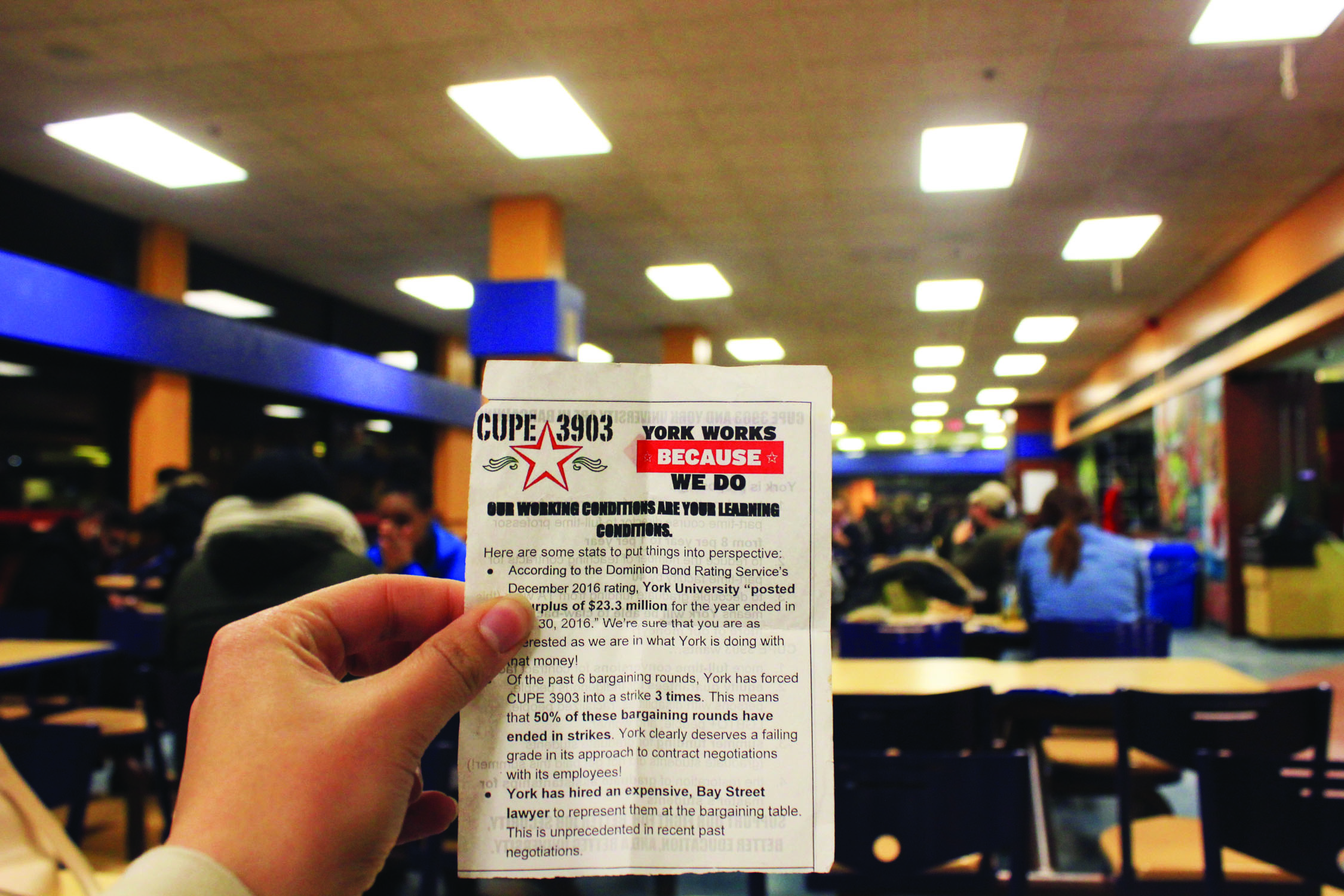Dennis Bayazitov | Assistant News Editor
Featured image: York’s CUPE 3903 is prepared to strike, should York fail to provide a satisfactory CBA offer | Basma Elbahnasawy
The Canadian Union of Public Employees, York local 3903 (CUPE 3903) is carrying out a general membership meeting on January 10, during which the Union will determine its bargaining priorities.
Should York and CUPE 3903 fail to reach a Collective Bargaining Agreement (CBA) by the Union’s final deadline—expected to be set for late February-early March—a strike mandate vote will be passed, which may result in a university-wide strike.
“We’re a membership-driven union and all the bargaining proposals have been already ratified by the membership,” says CUPE 3903 Vice-President of Unit One, Hossein Banitabaei.
“However, this meeting provides another opportunity to the membership to let the bargaining team know what their desired priorities are in the bargaining process.”
Bargaining began in the fall. Despite attending, presenting proposals and admitting room for compromise, CUPE 3903 does not believe progress is being made.
“There are still concessions on the table,” says CUPE 3903 Communications Officer Maija Duncan, “the same ones the employer tabled back in October. They haven’t moved at all on those, or even shown real willingness to discuss them.”
Banitabaei says so far, the bargaining progress has been “unsatisfactory.” Some of the proposals were tabled, a number of counters were proposed, and CUPE 3903 has not yet received a clear response to many of them, as they are kept under investigation, according to the employer.
“With the stalling tactics that York implements, the progress has been below what the Union expects and we feel the employer is not aligned with us on many major issues.”
As such, CUPE 3903 decided to file for conciliation with the Ministry of Labour on December 4 to push the bargaining process forward.
The hope is that this will help both parties form a mutual understanding in this process and move closer towards achieving CUPE 3903’s primary goal of using the bargaining table to achieve what they feel is a fair CBA for the members in all three units.
Some of CUPE 3903’s demands include: 100 per cent coverage of public transportation costs, reimbursement for the cost of mileage and parking, partial monthly refunds for those living on campus, and preventing preferential treatment for summer TAships.
Additional prioritized issues include: class size, employer delays in payments, childcare funding, child-friendly spaces on campus, support for sexual assault survivors, and equity proposals.
Another contentious issue concerns the conversion program—created for long-serving, high-seniority contract faculty, who often serve for 10 to 20 years at York. Such faculty have the option to apply for the program to convert to the York University Faculty Association (YUFA).
“They will be converted—not into a permanent job, but into the possibility of a tenure track appointment,” Duncan says.
“YUFA’s been in place since 1988 and has been very successful at matching qualified candidates to tenure track positions.”
In their prior contract, CUPE 3903 negotiated eight conversions per year. For the current contract, York has asked for one per year, stating when contracts are renegotiated, it is as if a new one has been created. The Union disagrees, insisting contracts ought to build upon what has already been established in prior contracts.
In this particular round of bargaining, the head of the employer’s bargaining team is an external lawyer—Simon Mortimer, from Bay Street law firm Hicks Morley—not an individual from York, which seems to slow the process, spending “significant time on unnecessary discussions, rather than getting to the main bargaining business, which is tough enough on its own,” Banitabaei says.
As of now, bargaining is still in progress, but CUPE 3903 acknowledges it is heading in the legal procedure towards a possible strike. On December 4, the Union filed for conciliation.
Beginning January 9, meetings with the newly-appointed Conciliator will take place twice a week in an attempt to accelerate the bargaining process.
Should conciliators file a No Board Report with the Ministry of Labour—admitting the parties are still too divided even after conciliation—a 17-day period will follow.
“After that, we would be in a legal strike position,” Duncan says. “But that’s still not when we would make the decision.”
The decision would be made once York presents their final offer before CUPE 3903’s final deadline, in the event the membership chooses to decline. The exact date of this deadline has not yet been announced.
Right now, CUPE 3903’s main focus is the Strike Mandate Vote through which the membership will send a strong message to the employer on how seriously they take their proposals. The Union is currently implementing easy access to a polling station for membership to cast their votes, and expect a high turnout.
“We’re well prepared in case membership finally gets a fair deal in the picket lines,” Banitabaei says.
Members of the Union believe there will be a strong vote in favour of a strike.


